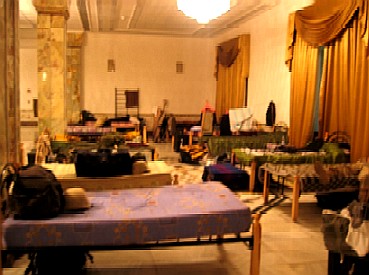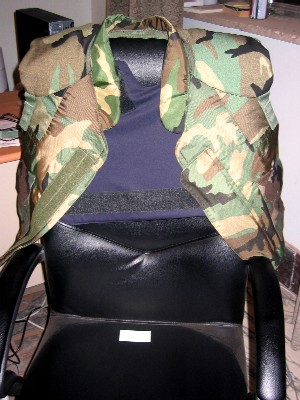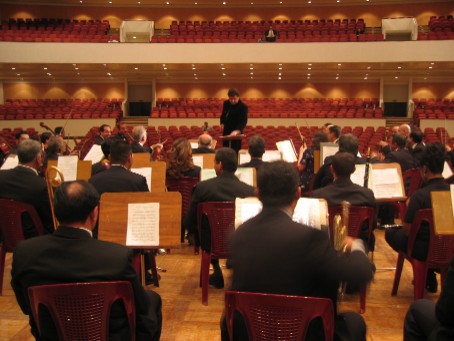Credit:
Adrian is a lawyer with the Department of Defense whose specialty is working with the governments of North Korea and the Vietnam trying to locate the remains of military personnel who are still listed as "Missing in Action." This is a very worthy effort, and Adrian is a very worthy guy.
I've never asked Cronauer if he really started his radio show with "Goooooood Morning, Vietnam" as Robin Williams does in the movie, but we will stipulate - for the next four months or so - that he did.
A former Member of Congress from Minnesota (a Democratic Member of Congress) and current friend and colleague named Gerry Sikorsky suggested the title of these Travelogues in an e-mail.
Both Cronauer and Sikorsky get full credit for the title. The content - for better or worse - is my responsibility. From The Green Zone
Thursday, November 14, 2003
A Lot Happened This Week. 90 Minutes of it Had to do with an Attack.
When we last spoke, I was scheduled to leave for Baghdad at five on Saturday morning. I was like an eight-year-old waiting for the camp bus. I was so worried that I'd oversleep, that I didn't sleep at all.
We had been told that we would need our helmets and our flak jackets for the flight to Baghdad so, being very crafty, I unloaded my duffel bag and re-packed with the vest and the helmet on top.
That was at about two in the morning.
I read for a while, answered some e-mails, flipped through the television channels, and wandered around; then I thought I'd better check the packing again, so I did.
When I looked at my watch it was 2:03.
Earlier in the day, a group of South Africans showed up to replace the four guys who had left the day before. It turned out they were working for a contractor to provide executive security.
These are big guys. At dinner that night, I said I'd be happy if they protected me. We laughed and laughed and laughed, and they joked in Africaans.
I had been serious, but I played along.
On time, a truck came by to pick up everyone's luggage, followed by a bus for ourselves.
When we got to the airport, most of the group got to go to the PX. I had to wait behind because I had come in on my visa instead of showing my Department of Defense ID card which the Kuwaitis are accepting as an entry document.
The problem is, if you have your visa stamped on the way in, you have to have it stamped on the way out or all manner of horrid things might happen to you the next time you happen to be in � KUWAIT!
Nevertheless, I did the right thing and waited until the immigration people did whatever immigration people do and my passport was returned with a spanking new exit stamp.
The DoD-card people also got to go to the mess hall to have breakfast. I was told there was a Subway truck at which I could purchase some food.
I bought a six-inch double-meat tuna on the grounds that I wasn't going to eat the bread and I wanted to have plenty of food in my stomach because we were going to make a stop up north before coming back into Baghdad.
I was just about to scrape the tuna off the bread and chow down when someone asked me if I got sea sick, or air sick.
As it happens. I do.
I even get car sick in the back of a sedan.
"Why," I asked?
"Ain't you heard of a combat landing?"
"Um. No." Although I did seem to remember something about a rough ride in the briefing the night before.
"Well you drop from about 30,000 feet to about two feet in about two and a half minutes, and you'll leave that sandwich on the ceiling of the plane if you're given to being air sick."
I wondered if I could cancel the whole deal right now.
We were led out to the plane and we stepped onto the C-130.
The thing about a C-130 is this. It is a cargo plane. As in stuff. It is not built for passengers. It has no seats and it has no toilet, to speak of.
To suggest passengers were an afterthought is to suggest anyone ever considered that passengers might ride in there.
The first thing you get are ear plugs. The next thing you get is the safety briefing which is something like this:
There are two stand-up relief tubes (if you don't know what they are, ask someone and, in any event, they are not terribly useful if you happen to be of the female persuasion) but you will not be able to reach them because the cargo is in the way.
We are supposed to have airsick bags on board but we're out of them, so just do your best. We'll be flying to [deleted] first which is about [deleted] hours away; then we'll go on into Baghdad. Sometimes I'll put in that [deleted] business. Other times I will simply write around it.]
Period.
No "Have a pleasant flight." No "Glad to have you with us today. No "We'll be serving snacks in the main cabin and a sumptuous four-course dinner in the first class cabin."
Here's a picture of me waiting to take off.
This was the last time I was to smile.
Period.
Until including right this minute.
Actually, the flight to [deleted] wasn't horrible; it was smooth and noisy as it is a four propeller CARGO plane but then he began his approach to land in [deleted] and I wished and wished and wished I had never heard of tuna fish; or Iraq; or airplanes; or the Earth; or anything else.
Think "roller coaster." On a ferris wheel. In a thunder storm. With a broken bearing.
Suffice it to say, I did not get sick. But not by much. Neither did anyone else. But, as the conversations while we were on the ground revealed; not by much either.
Take off from [deleted] was fairly dramatic as well but the flight to Baghdad was smooth and by this time I had an idea of what to expect so I steeled myself for the landing and survived it.
The first think you notice about Baghdad is the sand. It is everywhere and gets into everything including your clothes, your hair, your eyes, your nose and your lungs.
It is not sand as you would see at an American beach. It is more like talc which has been crushed and refined into something much finer.
Here's a photo of a truck:
I swear I didn't do that. If I had the chance, though, I would have done a "Kilroy was here" sign in the dust.
A couple of weeks previous the Al-Rasheed hotel was attacked by rocket fire, killing a Colonel who was, by all accounts, the most decent and thoughtful of men.
As a result, the hotel was closed and several hundred civilian employees had to move back to the Palace. As a result of that, sleeping space was at a premium.
As in, "There isn't any."
To be fair, I had been told that there was no space and I would either have to sleep in the dorm or in a tent. I had visions of a six-month M*A*S*H episode, so I waived my right to stay at the Hilton in Kuwait and come on out on the vomit comet.
The dorm is a series of large rooms inside the Palace in which some 200 beds have been placed.
200 men sleeping in close proximity sounds very much like � like � the inside of a C-130.
My first night I got to sleep at about 11 pm and I was so tired I just crashed.
The next night, however, I was up until 2 AM working on a document and even though I was exhausted I lay awake looking up at the 50-foot ceiling (or where the ceiling would have been had lights been on) listening to the snoring and pretending to be no The Discovery Channel.
"Oh, that one sounds like a lion, Jim," I said to myself.
"And that, unless I'm very much mistaken, sounds like a jackel, Harold."
Then I started giggling. Then I got reeeeeeally worried: I'm losing it and I've only been here for 24 hours.
The work day here is from about 8:00 am until somewhere around 10:00 pm six days a week. On Fridays (remember the Arabs' work week is from Saturday until Wednesday) everyone gets to sleep in and the day doesn't start until noon.
In the Palace, meals are served in the huge dining hall. The catering folks get upset when you call it "the cafeteria," I found out.
In most cases you just plop down where ever there is an empty seat so you chat with people doing fairly remarkable things.
I've eaten with an oil guy who has been helping that that industry back on its feet. According to him the daily average is up to about 2.3 million barrels which is well ahead of the plan which was to have been 2.1 million barrels per day by December 1.
Another guy works with the water departments. He marveled at the ingenious way the Iraqi managers had been able to keep these horribly outdated and badly maintained facilities functioning while the Coalition workers help them get new equipment ordered, delivered, installed and operating.
The best part, though, is the kids - both civilians and military. They are upbeat; they are enthusiastic; they laugh and carry on like kids everywhere at meals (with the possible exception that the soldiers have their rifles at their feet and body armor on their torsos.
The young civilian workers don't generally carry weapons (the rule is military personnel can have loaded weapons; civilian workers who are not security personnel can carry weapons and ammunition but not with the weapons loaded.
It's amazing, really, how quickly one becomes used to standing in line behind a soldier with a rifle over a shoulder, a pistol strapped to one thigh and a Crocodile Dundee knife strapped to the other.
And that's just the females.
One of the reasons for the long, long hours is the time zone we are in. Eastern plus eight. So, when we assemble for our morning meetings (I have one at 8:30 and another at 8:45 for example), it is midnight the night before in the East.
By the time our workday would normally end - about six in the evening - it is only 10 in the morning in the East and the phones start ringing from the US.
People learn pretty quickly to turn off their cell phones when they go to bed. If not, they are guaranteed to be awakened at 2:30 in the morning, greeted by family, friend or colleague with "Oh, sorry did I wake you? What time is it there?
The other reason for the long hours is the vast amount of work to be done and the number of people available to do it.
Unlike many offices in, say, YOUR town; there is surprisingly little grousing about the conditions or the work or the leadership or anything else.
That is not to say everyone skips into work every morning, but given the hazards of just being here, the huge proportion of the people I've run into are in very good humor almost all the time.
The third night I was in Baghdad I couldn't stand another night in the dorm, so I decided to sleep on the floor of the office I share with four other people. The Palace is built like a bunker and no rooms are small, so there was a TV set (we have four to watch the US and international cable news channels) a bathroom a reasonable distance away; and privacy.
I asked my office mates if they minded. They did not.
There is nothing much to report about this night except, once again, I didn't get finished until about two and after dragging a mattress out of a closet and putting on the sheets I had taken from the dorm; I lay down and what do I see?
A creature. Walking on the wall.
A gecko or something like it. I don't even know if they have geckos here. I wanted to say something amusing about buying car insurance from him, but I was in fear that he would decide to snuggle up with me on the floor so I was paralyzed with my eyes open.
I went rooting around the smallest of my three duffel bags through all the stuff I bought from the CVS drug store before I came here. Wouldn't you know it? The one thing I needed - Gecko Be Gone - I forgot.
That was a bad night for another reason. I am not proud of this.
When I had returned to the dorm I found a note saying that everyone was going to have to move out by the next night because they were reconfiguring that space for offices.
I have four large bags and moving them to the office meant taking them down a half flight of stairs; then back up another five or six steps; down a very long hallway, then into my office.
My office happens to be in an area which is protected because of its proximity to Ambassador Bremer; so I have to walk through a magnetometer about 25 times a day. The young soldiers who guard that particular checkpoint get to know the regulars, so after a cursory glance at your credentials they tend to wave you right through.
This night, however, I must have just caught the shift change. I was tired, sweaty, hungry, I had a lot more work yet to do and a young soldier challenged me saying I was not on her list to be in that area and she had been told there was no reason for anyone bringing luggage in to that space.
I snapped at her. And immediately regretted it.
There is nothing on the planet to excuse my snapping at a kid doing her job in a professional manner.
I apologized about 10 times, but the damage was done.
I still feel awful about it. And I will continue to be becuase every time I go through those mags I remember the episode.
Drat.
The next night I was in the big bullpen area that houses most of the communications staff when we thought we heard a "boom." My flak jacket was across the way, so I wandered out to get it in case we had to go to the alert shelters.
As I was walking across the hall another BOOOM! went off and there was a definite shockwave.
I walked juuuuuuusssst a little more quickly for my protective gear and headed for the shelter.
There was no panic. Neither was there a sense of false bravado. Although this was my first attack, most of the others had been through several - including the attack on the hotel. They weren't afraid, but they weren't stupid, either.
Everyone gathered in their assigned spots; we were briefed on what was going on; people chatted and shared cell phones so they could call home and tell the folks they were safe and after about 90 minutes we were given the all clear and everyone went back to work.
The net result was a few cars torn up a small indentation in a parking lot; and people who would have finished work about ten, working until about midnight.
Another result is I now sit in a chair with my flak jacked draped over the back:
I checked with the Human Resources folks yesterday to see if there had been an exodus of people leaving after the attack.
Nope. A few, I was told, but almost every day one or two people decide they've had enough - even without an attack - so there was no spike in people wanting to go home.
That's what I'm saying: These people are as dedicated a bunch as I have ever met. From the youngest enlisted soldier to the few Generals we have; they get it.
A last point for this week. This afternoon Ambassador Bremer, fresh from a visit to Washington, spent a few minutes with the Iraq National Symphony Orchestra.
Some 40 symphonies from around the country - and more around the world - reached into their archives and shipped entire scores to the INSO because the orchestra here had nothing.
When the Ambassador arrived the orchestra was rehearsing the piece "Dawn" from Edvard Greig's Peer Gynt Suite.
Sometimes, progress is measured in grace notes.
The Americans who are here believe they can change the world. And they have a real sense of pride for having the opportunity to be a part of it.
More next week.
Click here to return to the Mullings page
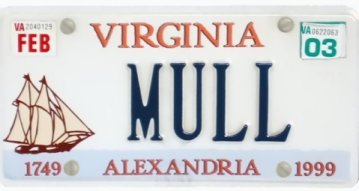


"Good Morning Vietnam," you remember, was a movie about an airman/disc-jockey named Adrian Cronauer. Adrian Cronauer is a real person who is an acquaintance and occassional lunch-date of mine. He does not look like Robin Williams. He looks, by his own description, like Robert Bork.
Chapter 3
A Lot Happened This Week.
90 Minutes of it Had to do with an Attack.
Baghdad, Iraq
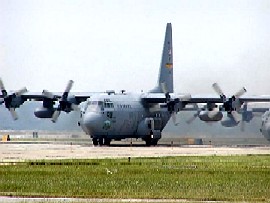
Put on your seatbelt which does not operate like the seatbelt in your car. Do not stand during take off. You will not be able to stand during landing, so don't worry about that.
[NOTE: I am being very careful about not straying into descriptions of locations and activities which might be useful for someone to drop a mortar round on my head. I made the decision to delete the first stop because I don't think it is terribly important to the narrative and I KNOW it's not necessary to tell the bad guys what the route of travel is for these aircraft.
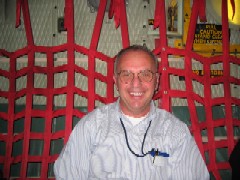
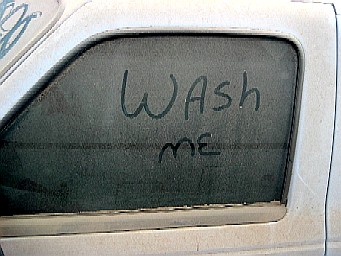 .jpg">
.jpg">
